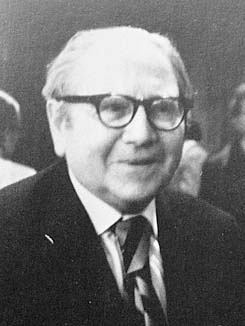
The Stefan Bergman Fellowship
The Stefan Bergman Fellowship was established in 2023 with the proceeds of the Stefan Bergman Trust to support the advancement of the research portfolio of a mathematician who specializes in the areas of real analysis, complex analysis, or partial differential equations. It carries an award of $25,000 and is typically conferred on one individual per year.
Awardees may use the fellowship in any way that most effectively enables their research — for instance, for release time, participation in special research programs, travel support, childcare, etc. The award is issued through the recipient's institution, however, institutions may not charge costs of any kind to AMS fellowships, such as fringe benefit rate, indirect costs, or overhead.

Stefan Bergman (1895-1977), is best known for his research in several complex variables, as well as the Bergman projection and the Bergman kernel function that bear his name.
Stefan Bergman was born into a Jewish family in what is now Poland. He earned his Engineering degree from the University of Vienna in 1920 and his doctorate in the Institute for Applied Mathematics at the Berlin University in 1922, under Richard von Mises.
In 1930 Bergman was lecturing at the University of Berlin. Between 1933 and 1939 he moved several times to escape anti-Semitic violence, ultimately going to the United States. He lectured first at the Massachusetts Institute of Technology, Yeshiva College, and Brown University. In 1945 he joined von Mises in Harvard.
In 1950 Bergman married Adele Adlersberg. His stay at Harvard lasted until 1952 when he moved to Stanford University, where he spent the rest of his career.
– From Bergman's MacTutor biography
Background
The fellowship honors the memory of Stefan Bergman, best known for his research in several complex variables, as well as the Bergman projection and the Bergman kernel function that bear his name. He was an AMS member for 35 years. When his wife Adele Bergman died, the terms of her will stipulated that funds should go toward a special prize in her husband’s honor.
In 2023 the AMS allocated the Stefan Bergman Endowment to establish the Stefan Bergman Fellowship as the society's first fellowship specifically for early-career mathematicians.
How to apply
The fellowship is open to mathematicians who specialize in the areas of real analysis, complex analysis, or partial differential equations; have not received tenure; and have not held significant fellowship support. One award will be made for the 2025–2026 academic year in the amount of US$25,000. AMS membership will also be offered to the recipient for the duration of the Fellowship.
The application form requires the following information.
- Research Statement: a statement regarding the applicant's overall program of research, past and planned. The statement should be no more than three pages, including bibliographical references.
- Research Plan: a detailed research plan for the fellowship period that is contextualized by the research statement. The plan should include a description of how the fellowship will support the applicant's success. The plan should be no more than one page.
- Key Professional Accomplishments: a list of up ten publications and/or other professional activities that demonstrate the applicant's contributions to the mathematics profession. This list should be no more than one page.
- Current and Pending Support: a list of current and pending research awards. For each, indicate the support status (current or pending), project/proposal title, source of support, total award amount, award period (start and end dates), location of project, and person-months per year committed to the project (calendar year, academic year, or summer).
- Positions and Fellowships since PhD: a list of all fellowships and comparable research appointments, such as a term at one of the mathematical institutes. Do not attach a vita.
- References: a list of three reference writers who can address the applicant’s accomplishments and research potential. Use the email links on the coversheet to send a password and instructions directly to the writers.
- 2-3 page NSF-style Biographical Sketch
Application deadlines
Applications will be accepted on MathPrograms from July 15 through Septmeber 30, 2024 (11:59pm EDT).
Contact
Provide your email to receive occasional communications from the AMS about research fellowships and other opportunities
Questions about the Bergman Fellowship? 
For all other Programs inquiries email AMS Programs staff.

